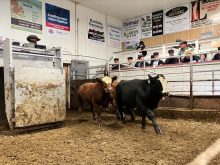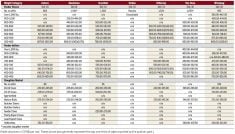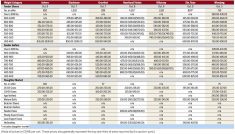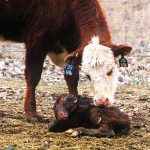Doug McLaren of JAS Red Angus near Neepawa is full tilt into the last few weeks before his farm’s annual bull sale April 7 — but he’s still not entirely sure what that sale will look like.

The McLaren family typically hosts their sale on the local show grounds of the Neepawa Ag Complex, also sharing the sale with guest consignors CAMO Cattle Co. This year, however, there has been some question of whether that public venue will be available, given concerns over the spread of COVID-19 and McLaren says the family might have to make a last-minute move to keep the sale on their farm.
“We don’t know for sure what’s going on,” McLaren said. “It’s certainly a time of uncertainty.”
As of March 19, Canada had confirmed 690 cases of the virus, with an additional 35 presumptive cases. In Manitoba, the province had reported 17 cases, including two from the Southern Health Santé-Sud Health region and one in the Interlake.
Read Also

Manitoba Crop Alliance’s 2026 board includes two new faces
For 2026, two new delegates join the Manitoba Crop Alliance’s board of directors, which in turn has re-upped the crop producer organization’s executive from 2025.
The pandemic has led to widespread closures, including schools as of March 23 and childcare facilities from March 20-April 10. Visitors to health facilities have been curtailed. Sport programs, concerts, community events and other gatherings have been cancelled and citizens have been urged by government to stay home when possible in an effort to “flatten the curve” of cases and avoid overloading the health-care system.
On March 16, the federal government announced widespread travel restrictions, as well as social distancing measures. Among those, Canadians were urged to keep two metres of space between people in public and avoid gatherings with more than 50 people.
Cancellations have not yet spread to the purebred cattle sector, which is moving into its peak bull sale season. Producers like McLaren, however, expect social distancing rules will impact how their shows move ahead.
Rick Wright, executive secretary for the Livestock Markets Association of Canada, says bull sale prices so far have been strong this year. However, the association has asked members to keep sales in line with the 50-person maximum attendance.
The general rise of remote bidding does allow customers to see animals ahead of the sale and bid remotely, he noted, while most big breeders already have their sales online.
“This is a long-term investment,” he said. “If you’ve got cows, you need bull power and you need good genetics and I think we may not see the crowds at the bull sales going forward that we’ve had, but I think the support will be there.”
Helge By, of Regina’s By Livestock, says sales on his schedule have gone forward so far, although owners have received calls asking if the sales are cancelled.
His sale management company is encouraging people to attend events only if actively interested in the animals, or to arrange to view bulls ahead of time and bid at home.
“The sales are still going, but (we’re) trying to minimize crowds and the effects of it through online bidding or telephone bidding, things like that,” he said. “The cows still need to be bred, so at that point, I think it’s still going to go ahead as planned.”
By recently managed a sale in Medicine Hat during the third week of March. The sale drew a “good” in-person crowd, he said, although he expects that might now start to change as the pandemic heats up in Canada.
Many breeders have also had limited contact outside the farm due to calving, By noted, something that may be lowering the perception of risk among potential sale attendees.
Online auction services have seen an uptick, according to Mark Shologan of DLMS, one of the providers offering online auctions. Shologan said he would typically see about 10 to 15 per cent of bulls in a sale to be bought through online bid. In the third week of March however, he said anywhere from 30 to 60 per cent of animals were purchased remotely.
His company’s schedule is also about to get busier.
“We are adding as many more sales as people want where we have staff and crew available for,” he said. “I think over the next five days we’ve added six or seven sales already and that’s happening right across the industry, not only with our company, but a couple of our competitors as well. Everyone’s just trying to add sales to help people out; to give their customers another option to still purchase bulls when they can’t make it there.”
The outbreak has altered how people are approaching the sale season, he noted, particularly in Alberta. Crowds have been much smaller in the sales he’s attended, he said, and venues are asking buyers to view bulls in staggered visits prior to the sale, and then bid from home.
The change has been less prevalent in Saskatchewan and Manitoba, although he expects that to soon change as COVID-19 concerns take hold.
“Right now, we’re looking at getting people through the next week,” Shologan said. “We’ve also added sales into April, but my goal right now is trying to make sure we have enough people in place and the infrastructure in place to get the sales in the next week taken care of, and then we’ll keep moving on.”
For his part, McLaren says his farm typically holds a video auction anyways, although the bulls are usually on display at the Neepawa show grounds.
“We don’t normally put our bulls through the sales ring,” he said. “We normally have them all on display in the facility in town and so that may or may not happen, but the fact that we have a video sale, I think we’re somewhat prepared at least for this eventuality.”
At this point, McLaren fully expects his show to go ahead. The video for the sale is already done and the farm’s catalogue has already gone out in the mail. The venue, however, remains a major question mark.
“We’re going to certainly make some alternate arrangements in the eventuality that, that public facility is closed and/or closed to us… we’re still basically three weeks away, so we don’t know what’s going to happen,” he said.
He has not yet had many calls asking whether the sale is cancelled, he said.


















